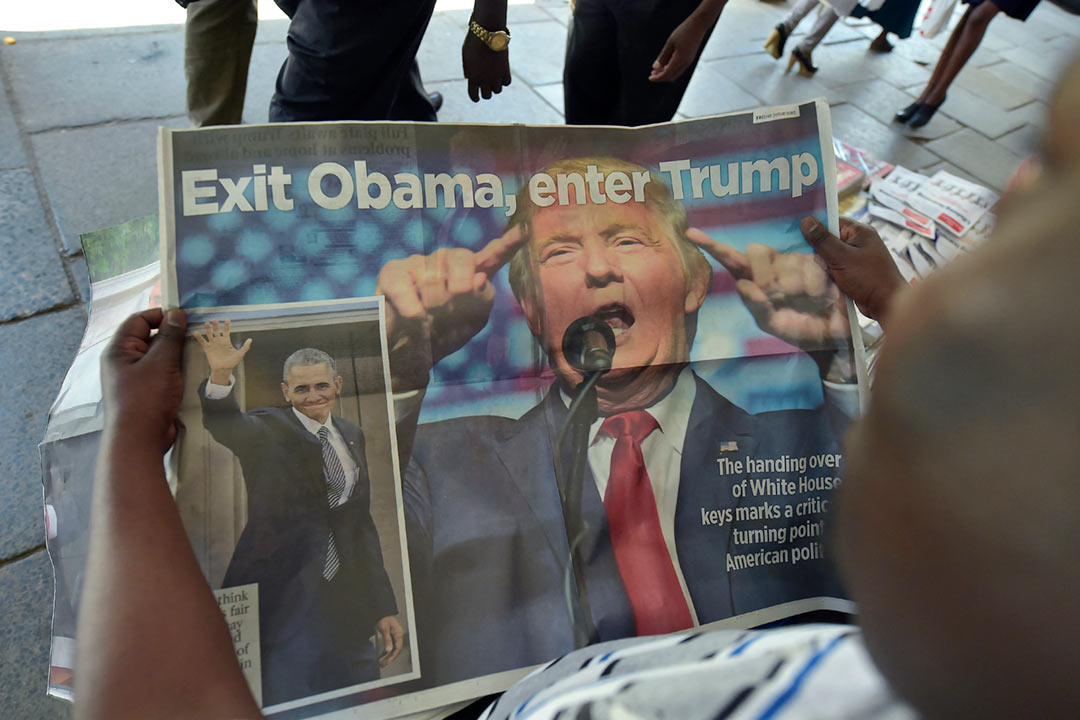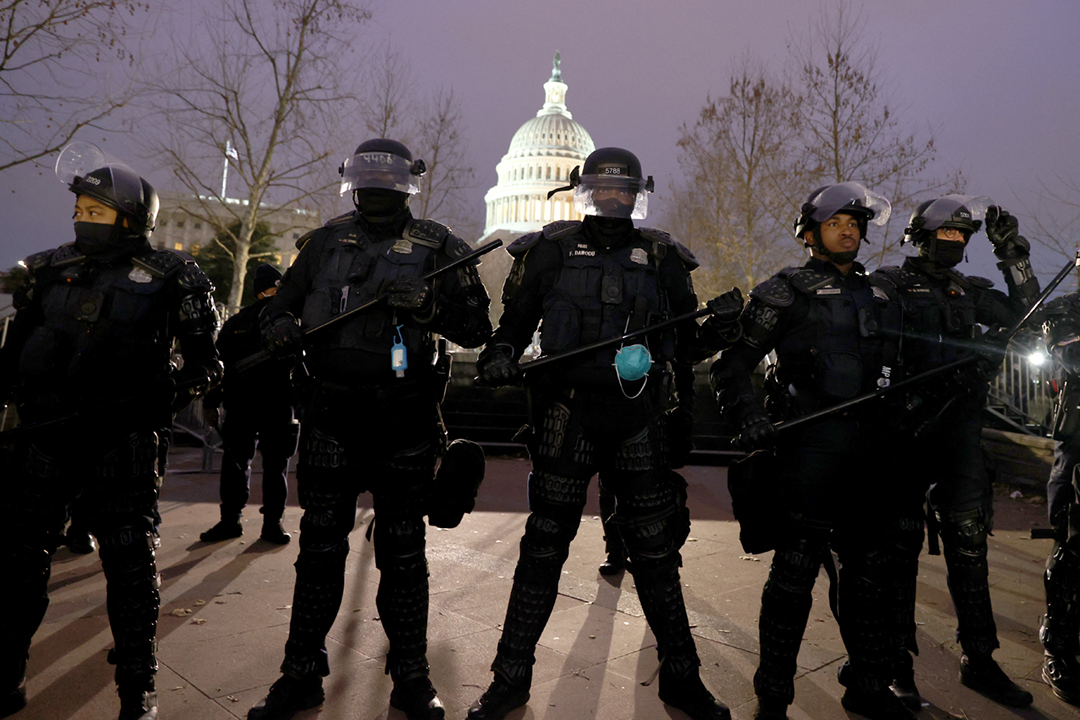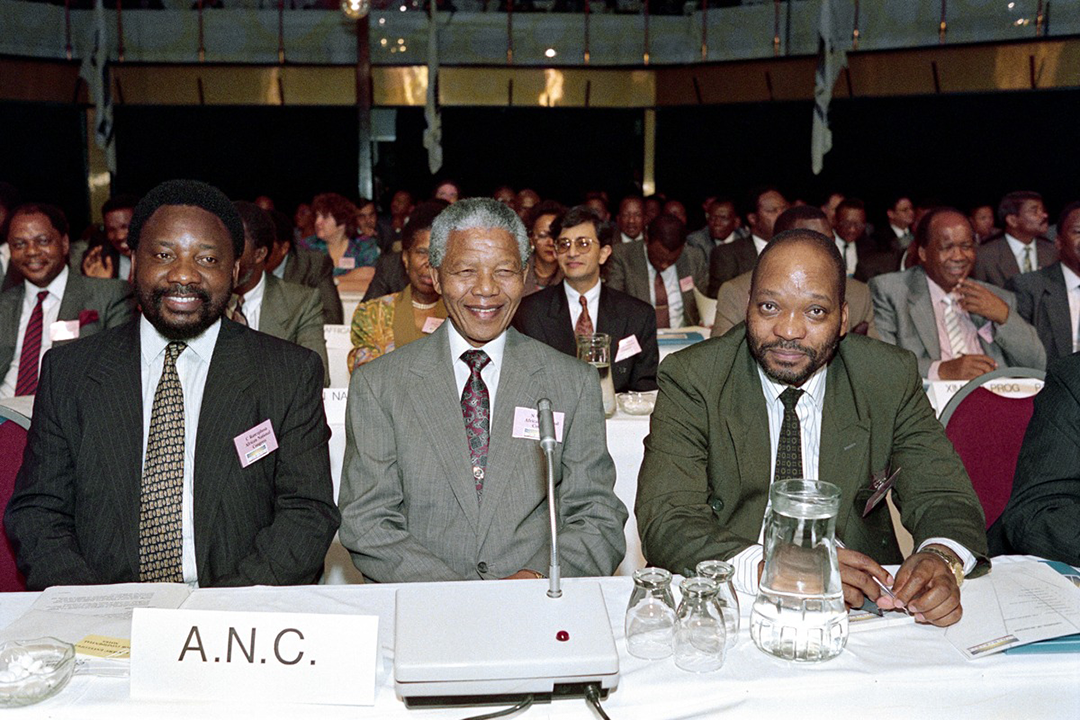Implications for American democracy promotion and influence in Africa
The 2020 US election meltdown may have dented the role and influence of America as the chief promoter and protector of democratisation in Africa. However, the resilience of US political institutions in the face of immense systemic pressure from the Trump Presidency opens a window of opportunity to how the US can refocus its approach towards Africa.

A Kenyan man reads a local newspaper pullout on American President Barack Obama and President-elect Donald Trump, on January 20, 2017 in the streets of Nairobi. Photo: Simon Maina/AFP
Democracy is anchored in the practice and norm of regular free and fair elections, which are vital for political legitimacy, peace and stability. Accordingly, the meltdown of the US 2020 presidential election caused in many Africans a mixture of alarm and glee, depending on how one views the role of the US in global affairs. The live-streaming of the chaos, cases of violence, deep partisan polarisation and persistent aberrations from the democratic process far detached from the rule of law, human rights and democracy underlying the US foreign policy towards Africa, raised a lot of scepticism abroad, subsequently battering its reputation as a leading global democracy.
But did the internationally reverberating chaos of the 2020 election substantially whittle down US influence on democratisation in Africa? If we take the view that this election demonstrated the fragility of democracy itself in any society, and the fact that US democracy survived the Trump-Biden transition because of its strong resilient autonomous institutions, the US may well take the step to tactically shift the focus of its democratisation thrust in Africa from the much-resented regime change approach to gradually fostering strong democratic institutions.
Post the US elections, two narratives have emerged: first, the severe threat to American democracy from former president Donald Trump’s dictatorship, domestically and internationally derailing to the US’s global role as the oldest and leading democracy, and secondly, pointing to the resiliency of the country’s democratic institutions.

WASHINGTON, DC – JANUARY 06: Police officers in riot gear line up as protesters gather on the U.S. Capitol Building on January 06, 2021 in Washington, DC. Pro-Trump protesters entered the U.S. Capitol building after mass demonstrations in the nation’s capital during a joint session Congress to ratify President-elect Joe Biden’s 306-232 Electoral College win over President Donald Trump. Tasos Katopodis/Getty Images/AFP (Photo by TASOS KATOPODIS / GETTY IMAGES NORTH AMERICA / Getty Images via AFP)
Moderates from both sides of the debate concede that there is a need for political reforms in the US to insulate its democratic-political system from new or emerging domestic threats to democracy. This should be achieved by adjusting the political system to new realities while mitigating the deep societal polarisation at the heart of the explosive political demonstrations that characterised the Black Lives Matter movements and later the violent attacks at the Capitol, as well as Trump’s rejection of the election outcomes, which undermined the legitimacy of the electoral process, the results and the incumbent Biden administration.
While the first narrative is evidence of a political system in crisis, facing failure and generating international anxiety amongst its citizens and partners abroad, as well as a satisfying moment of arrival from its critics, the latter view demonstrates the strength of US democracy, particularly its autonomous democratic institutions, in mitigating rowdy populist pressure from the deeply entrenched presidentialism on the US democratic system.
The call for reforms in the oldest and biggest democracy, in spite of the resiliency of its institutions, draws attention to the fact that democracy is not a state of regime change that a state or society arrives at, but rather, a process characterised by continuous reforms to build consensus and accommodation in order to mitigate violent political mobilisation, which will threaten democratic institutions and political stability.
Beyond and outside regime change, the US can better promote democracy will have to be seen to be built on continuous support to endogenous democratic institutional development and resiliency in Africa as medium- to long term-democracy promotion to foster the preservation of democracy and political stability through democratic transition and consolidation.
US elections are important to Africans for various reasons, including interest from both sides in collaborating on issues of mutual geopolitical and economic interest. America is the oldest democracy and leader of the free world. Based on its long history of domestic stability, policy practitioners have argued that democracy is the most stable political system, hence they have recommended democratic reform and institutionalisation as key to the promotion of peace, political stability and democracy in Africa, and a major issue for cooperation.
The Trump administration’s chaotic, if not disinterested foreign policy approach towards Africa, dramatised by the former US president’s ‘shit-hole’ reference to African countries, lacked a coherent broader strategy and was characterised by huge staffing gaps. There was a lack of experienced personnel in strategic public policy institutions. In spite of these factors, citizens in African countries, their governments and leaders, as well as civil society, still look to the US for democracy support and political inspiration.
Successive US administrations have fine-tuned their foreign policy and diplomatic obligations towards Africa to enhance growing US interest in the continent, as China moves ahead to consolidate its global diplomatic, geopolitical foothold and access to the rich natural resources in Africa. The US is also concerned with the growing threat of terrorism to American interests, which may worsen political instability in Africa.
The US contributes huge sums of aid to African countries to sponsor democratic reforms, promote peace and stability with emphasis on free and fair elections, rule of law and respect for human rights. The US has also taken advantage of slowly but surely growing liberalisation and pluralism in Africa to provide electoral assistance and capacity-building for a broad range of institutions. In spite of all such support committed to electoral institutions, new constitutions and civil society organisations provided to foster democratic governance, promote political activism towards challenging authoritarian rule and dictatorships, undemocratic regimes in Africa loathe the US’s emphasis on regime change, which they believe is a mask for externally driven political change to promote American interests within the continent.
African social movements, activists, academics and practitioners, impressed with the longstanding stability of the US democratic system, look to the American model of democracy for inspiration and support in the course of their own struggles for freedom and inclusive participation in government. However, they are mostly pressed to the wall by domestic authoritarian regimes who view them as Western agents advancing the American regime change agenda.
In equal measure, the US has faced extensive scrutiny in Africa for political duplicity, aggressively pushing democratic rule and rule of law abroad, foisting regime change on nations without necessarily practising democracy at home. Critics further cite domestic democratic deficits amid its high-handed efforts to promote its own style of democracy in much of Africa as arrogant and contemptuous of historical democratisation struggles that should be supported to encourage home-grown democracies.
Unsurprisingly, the implications of the 2020 US election for democratisation processes in Africa will be debated more than any other American elections. The democratic deficit characterising the Trump Presidency will provide propaganda cannon fodder for African despots and critics of American democracy, weakening democracy cooperation towards enhancing domestic agency for democracy in Africa.
While the US has used the luring demonstrative force of its strong domestic institutions and the legitimacy of its resilient, stable and democratic political and economic system as an example to the developing world, including Africa, its chaotic 2020 presidential election provided parallels with cycles of disputed elections in many African countries, undermining faith in democratic institutions and pointing the finger of authoritarian culpability to the main sponsor of democracy, the US. The failures of the US electoral process resonate far beyond its shores.
As the US is a global power, the state of its democracy, the manner of its elections, their outcomes and processes of transfer of power, are important to transitioning and consolidating democracies, as well as ambiguous regimes in Africa struggling with democratic change. The captivating optics of the US democratic process capture the attention of both critics and proponents of US democracy, as many Africans follow the processes and political rituals of US democratic contestation – from the campaigns and voting to the announcement of the election results and transfer of power to the new regime.
US election campaigns are viewed by many Africans as democracy at work. The public debates on national media, reflecting important contestation over ideas and policies, are an important socialising effect for many African proponents of democracy. Learning from the US free market of ideas, Africans have started to demand official presidential debates between the main candidates vying for national office as competitive elections become a norm. At the same time, pressure is mounting for more policy and political accountability, as well as for leaders to display political maturity.
The 2020 US election exposed the fragility of American democracy, and democracy in general, something the West thought it had long gotten past and which may only be a major problem abroad, particularly in Africa.
Trump’s belligerence and the deep political polarisation he caused triggered domestic partisan violence, culminating in an unprecedented attack on the Capitol by a mob backing his Republican Party faction. The US faced the real possibility of a blocked transition and transfer of power as the former president refused to concede. Through this action, Trump exerted intense pressure on US democratic institutions, exposing the country’s political system and the basic machinery of its democracy as dysfunctional and broken.
The presidential election was plagued by long queues, ballot-counting delays, disputed election results and recounts, which are regularly witnessed as part of electoral fiddling in Africa. Even after the recount and official reconfirmation of Joe Biden’s victory, Trump refused to concede the race or recognise the president elect, leaving a cloud of disputed legitimacy hanging over the new administration. Furthermore, the Trump administration refused to help with an orderly transition and transfer of power, while his supporters pulled every stunt to drag out, frustrate, block or even overturn the results, widening adversarial domestic political division and polarisation in the US.
The anarchical attack on Capitol, just as Congress was in the process of certifying Biden’s victory, made a mockery of the rule of law and jeopardised the peaceful transfer of power, the most challenging aspects of democratic transition in many African countries. Where many African regimes have not brazenly rigged elections, triggering post-election violent conflict, incumbent authoritarian regimes have simply blocked the transfer of power, impeding any process of political change to retain the incumbent or enable a faction to remain in charge of the state. An example is Kenya in 2007, 2013 and 2017 and Zimbabwe in 2008, 2013 and 2018. Obstructing the process towards a peaceful, democratic transfer of power continues to be a major problem in Africa, a major source of political violence, political uncertainty and instability. The chaos of the US election therefore undermined its global influence and right to continue to weigh in on cases of disputed legitimacy in Africa. This left the main sponsor of democracy reeling under aspersions that chaotic authoritarianism was undermining its role as the global torchbearer of democracy.
The state of democracy in Africa is worrying; drivers and proponents of democratisation need moral and political support that is genuine and legitimate.
The Freedom in the World 2019 report flagged the widening global onslaught on democracy and pluralism, and the spread of harmful influence to new corners of the world. It also described how chief executives in the US, the world’s largest democracy, were willing to break down institutional safeguards and disregard the rights of critics and minorities in favour of populist agendas.
African countries continue to experience extensive cases of democracy backsliding centred on disregard for the rule of law, the violation of human rights, flawed electoral processes and shrinking democratic space. While countries like Ethiopia have made some progress with regard to political reforms, the majority of African countries, including Benin, Senegal, Nigeria, Guinea, Tanzania, Zimbabwe, Sudan, Uganda, Ivory Coast, Malawi, Burundi, Benin, Cape Verde, Chad, Djibouti, Gambia, Libya, Niger, Republic of Congo, São Tomé & Príncipe, Somalia, and Zambia are facing declining prospects for democracy as their leaders apply various authoritarian strategies to entrench their hold on power.
The Biden administration is therefore facing huge international expectations and obligations with respect to protecting democratic norms and practices in Africa that will compel the US to continue to support democratisation in the continent. But how and with what leverage can the new US leadership strongly back democratisation in Africa?
The biggest lesson, and maybe point of leverage for the US in support of democracy going forward, is the realisation that democracy is perennially fragile, and its survival depends on strong, stable and autonomous institutions.
US institutions demonstrated themselves to be resilient and a strong anchor to unprecedented pressure on American democracy, insulating the country’s political system from direct assault by the former incumbent regime. The Biden-Harris administration should therefore rethink democratisation in Africa from mere regime change to domestically-driven medium- to long-term institutional reform more commensurate with genuine multiparty politics, political accommodation and inclusive democracy.
The US’s support for democracy is suspected of being a means for hostile regime change by means of using and supporting elections as key events to remove African regimes not favourable to US successive governments. Certainly, regime change has triggered serious and debilitating violent conflicts without necessarily fostering democratic installation and stability in many African nations, instead having the effect of undermining citizens’ confidence in elections and multiparty democracy.
Gideon H Chitanga is a PhD student at the University of Pretoria, Political Science, researching regional mediation, pan-African diplomacy and democratic transition. His broader research interests include democracy in Africa, media, diplomacy, international relations and global affairs. Gideon is also a research associate at the African Centre for the Study of the United States (ACSUS), University of the Witwatersrand and an academic fellow at Africa No Filter, a donor collaborative researching how global media cover Africa, focusing on the African narrative. Gideon is Africa analyst for CGTN, and is regularly featured on the major TV and radio channels in South Africa, providing analysis on key continental issues.












